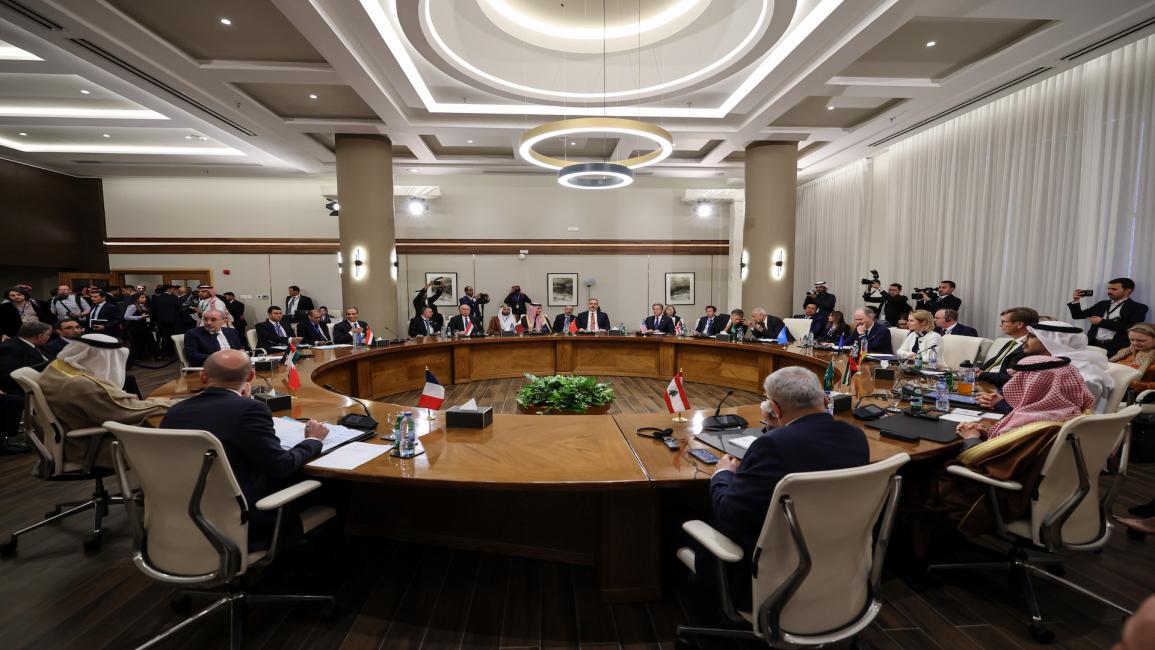The Arab Center for Research and Policy Studies (ACRPS) has published an in-depth report analyzing the outcomes of the Aqaba Summit and their implications for Syria’s political transition. The summit’s final statement has sparked divided reactions among Syrian political actors, reflecting the complexity of Syria’s internal and external political landscape.
Support and Opposition
The report highlights that the Syrian National Coalition and the Syrian Negotiation Commission welcomed the initiative. In their statements, both groups viewed the summit as a critical step toward achieving a comprehensive, Syrian-led political transition. The coalition described the Aqaba initiative as “a sincere and significant effort to fulfill the aspirations of the Syrian people by fostering an inclusive transition process.” Similarly, the Syrian Negotiation Commission hailed it as a “balanced project to save Syria and ensure its unity.”
However, other Syrian factions rejected the initiative, raising concerns over its motives and potential consequences. Critics argued that the Aqaba Summit could place Syria under international tutelage, undermining Syrian sovereignty and transforming the political solution into a regional or international process.
The report identifies these contrasting positions as indicative of the broader legitimacy crisis and power struggles among Syrian political actors. Supporters of the initiative seek to secure their role in the transition process and prevent any single party, particularly the new authorities in Damascus, from monopolizing power. Conversely, opponents highlight the failures of similar international interventions in Libya and Sudan as cautionary examples.
The Role of UN Resolution 2254
The report delves into the significance of UN Resolution 2254, which has been a cornerstone of international efforts to resolve the Syrian conflict since its adoption in 2015. The resolution outlines key steps for a political transition, including:
– Establishing a transitional governing body with full executive powers.
– Drafting a new constitution.
– Conducting free and fair elections under UN supervision.
Proponents argue that the resolution remains a valid framework for Syria’s political future, particularly given its emphasis on inclusivity and neutrality. The Geneva Communiqué (2012), which underpins Resolution 2254, stresses the need for a safe and stable environment to facilitate the transition and ensure meaningful participation by all segments of Syrian society.
Challenges and New Realities
The report acknowledges that the fall of the Assad regime has introduced new dynamics, raising questions about the applicability of Resolution 2254. Critics argue that the resolution was designed for a negotiated transition involving the Assad regime and opposition forces—a scenario no longer relevant. They contend that Syria’s transition requires a new legal and political framework to address the country’s evolving realities.
At the same time, the report warns against reducing Syria’s political landscape to two dominant forces: the remnants of the old regime and Hay’at Tahrir al-Sham (HTS), which currently wields power in parts of northern Syria. The exclusion of other political and social actors, it argues, risks creating a new form of authoritarian rule.
To address this, the report proposes steps to ensure a transparent and inclusive transition process:
- Drafting a new constitution through a broad-based constituent assembly.
- Holding a public referendum on the proposed constitution.
- Dissolving armed factions and rebuilding a unified Syrian military with participation from defected officers.
- Engaging Syrian political and social forces, both inside and outside the country, in shaping the transition.
Fears of External Interference
A significant concern raised by opponents of the Aqaba initiative is the potential for external actors to exploit UN Resolution 2254 to impose a political solution that aligns with their interests rather than the aspirations of the Syrian people. The report acknowledges these fears as legitimate but argues that they can be mitigated through national unity and a commitment to inclusivity.
The key to overcoming these challenges, the report asserts, lies in fostering a Syrian-led political transition that prioritizes national interests and reflects the goals of the Syrian revolution. This requires building a political system that guarantees Syria’s territorial unity and ensures equal representation for all its people.
Conclusion
The ACRPS report concludes that the Aqaba Summit and its reliance on Resolution 2254 have deepened political divisions within Syria. While some see the resolution as a safeguard against power monopolization, others fear it opens the door to international interference.
The report emphasizes that a successful political transition depends on broad participation, transparency, and a clear roadmap. The Syrian people must be central to this process, with their voices guiding the transition’s goals and mechanisms. By aligning with the revolution’s principles and fostering national consensus, Syria can navigate this critical phase without falling into renewed authoritarianism or external dependency.
This article was translated and edited by The Syrian Observer. The Syrian Observer has not verified the content of this story. Responsibility for the information and views set out in this article lies entirely with the author.


